Here are eight gym errors made by the 65+ crowd, both men and women, plus tips to avoid these mistakes.
As the population ages, more and more seniors are getting gym memberships.
Recapturing some youth is on their hot list, but also important is that of slowng down the aging process.
1 Skipping Warmups and Cooling Down

Shutterstock/MilanMarkovic78
One of the most common mistakes people 65 and over make is neglecting proper warmup and cool-down routines.
You might be thinking that these approaches aren’t necessary due to the older person’s inability to exercise strenuously.
But as we age, our muscles and joints require more time to prepare for physical activity — even if it isn’t vigorous or intense.
Skipping these crucial steps can lead to injuries, strains and overall discomfort.
Tip: Incorporate gentle cardiovascular exercises like walking or stationary cycling for 5-10 minutes before starting the main workout.
After the workout, allow time for stretching and relaxation to cool down.
2 Overlooking Strength Training
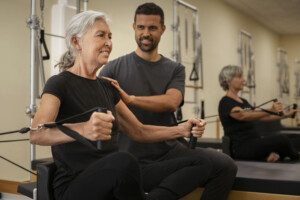
Freepik
Some seniors may focus solely on cardio exercises and overlook the importance of strength training.
Others don’t even do any cardio and spend all their gym time either in the whirlpool or bobbing around in the swimming pool.
Even for those who actually swim laps, this is no replacement for resistance training on dry land where gravity is in full force and effect.
Maintaining muscle mass is crucial for balance, joint health and overall functionality, especially in older age.
Tip: Include resistance training at least twice a week, focusing on major muscle groups.
Consult with a fitness professional to create a safe and effective strength training routine tailored to individual needs.
3 Using Incorrect Form
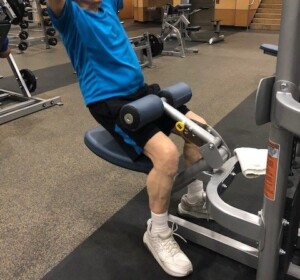
Improper form during exercises can lead to injuries, especially among older individuals.
This mistake is often the result of not seeking guidance from fitness professionals or attempting exercises beyond one’s capabilities.
Common mistakes I’ve seen among senior gym users include loading a machine too heavy, leading to bad form for the exertion, and then letting the weights “fly” back in place on the release.
Tip: Request assistance from gym staff or hire a personal trainer, even if just for a few sessions.
Ensure proper form and technique, gradually increasing intensity as strength and confidence improve.
4 Neglecting Aerobic Exercise
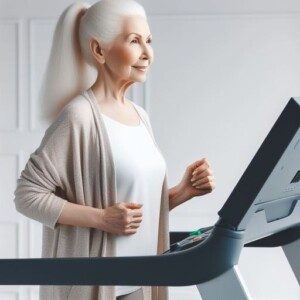
©Lorra Garrick
Some seniors will do weights but not any aerobic or cardio exercise — at least while they’re at the gym.
Certainly, it’s quite possible the ones whom are seen doing only strength training may have cardio equipment at home or prefer walking outdoors.
But many older people don’t do any cardio at all. Unless their doctor has told them that all forms of aerobics are bad for their joints, they absolutely need to be doing aerobics of some sort.
5 Neglecting Balance and Flexibility
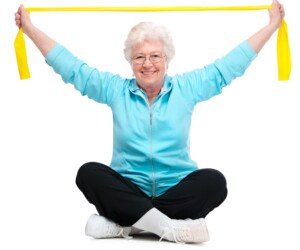
Shutterstock/Alexander Raths
Maintaining balance and flexibility becomes increasingly important as we age, yet many seniors neglect these aspects in their workout routines.
Poor balance can contribute to falls, while limited flexibility may lead to discomfort and reduced range of motion.
Tip: Integrate balance exercises like standing on one leg and flexibility routines such as yoga or tai chi into your workout plan.
These activities will not only improve your physical well-being but also enhance mental focus and relaxation.
6 Ignoring Individual Limitations
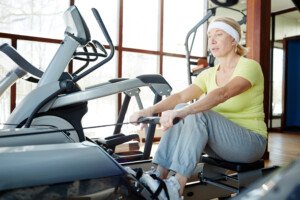
Shutterstock
A common mistake is pushing oneself too hard or attempting exercises that are beyond individual capabilities.
Ignoring personal limitations can lead to injuries and discourage continued participation in physical activity.
Tip: Listen to your body and modify exercises to suit your abilities.
Progress gradually and communicate any concerns or physical limitations with fitness professionals who can tailor a program accordingly.
7 Not Staying Hydrated

Dehydration can be more common in older adults and can impact exercise performance and recovery.
Many seniors may not drink enough water during their workouts, increasing the risk of fatigue and overheating.
Tip: Stay hydrated before, during and after workouts.
Bring a water bottle to the gym and sip the water regularly, especially if engaging in longer or more intense exercise sessions.
8 Consistency and Patience

Shutterstock/Pikselstock
Some seniors expect immediate results or may become discouraged if progress is slower than expected.
Consistency and patience are key elements in any fitness journey, and expecting rapid changes can lead to frustration.
Tip: Set realistic goals, celebrate small achievements and understand that progress takes time.
Consistency in attending the gym and maintaining a regular exercise program are essential for long-term success.









































